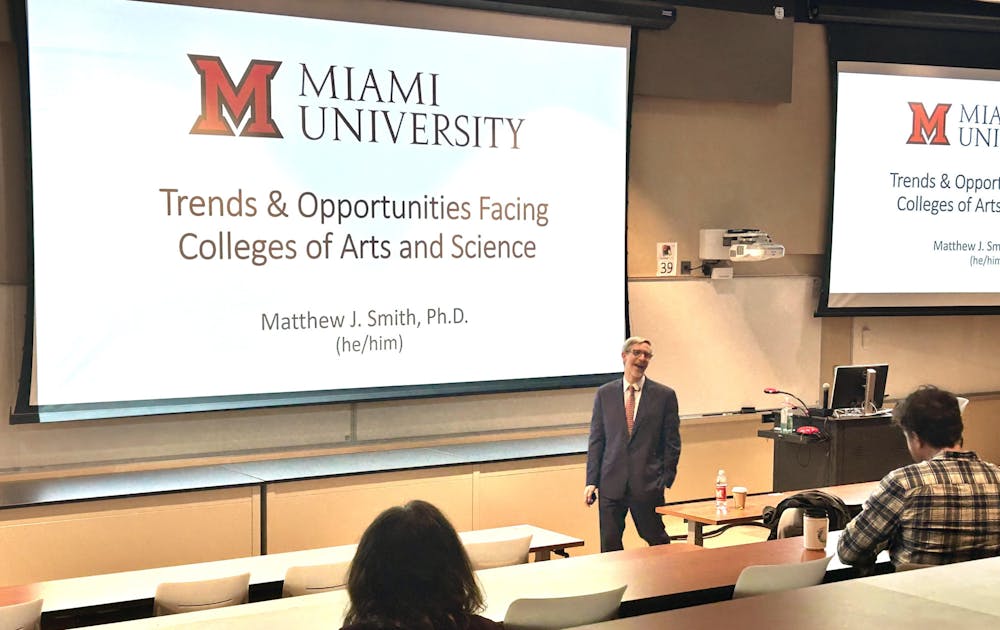Miami University’s College of Arts and Science’s (CAS) dean search continued on the morning of Feb. 20 when Matthew Smith, one of the four final candidates, held his second forum.
Smith began by discussing his history with Miami as a faculty member.
“I'm always grateful to Miami for the foundation they gave me in my career, and when I saw this position open up, I was very excited to consider the possibility of coming back,” Smith said. “Knowing your reputation for education, for the teacher-scholars and for the care that I’ve seen your faculty demonstrate to people, I’m really excited.”
In Smith’s speech, he outlined strategies he would use to strengthen and retain liberal arts traditions at Miami, considering the trends and opportunities facing colleges of arts and science right now.
He said a major trend currently sweeping the nation is a rise in antipathy toward higher education and liberal education. To fix this, he said the university needs to spotlight graduates who have been highly successful with liberal arts degrees and those still earning them.
“I've helped my colleagues in the history department [at Radford University] build something called the center for archives and digital history,” Smith said. “The idea of the center is that students do history. They don't just show up for a lecture. They're actively going out, seeking the artifacts, the letter documents of history, putting them into the lab and preserving them.”
At Radford, Smith said they created a Wicked Initiative to teach students about global issues and invite them to innovate solutions. The university then took it one step further and created a Wicked Festival, where hundreds of students create projects across multiple departments and disciplines and present their results.
“That's interdisciplinary, where it's not just one department doing one thing, it's multiple departments serving a common cause in support of students and their aspirations,” Smith said. “That's what I want to see more people do in the liberal arts as it matures [and] as it evolves.”
When speaking on retention at Miami, Smith said it’s all about extending hospitality and the importance of creating a sense of belonging both academically and personally for students, staff and faculty. He said as dean, he would talk to people across the college — the different chairs, directors, staff and students — to build community and garner feedback to move the college forward.
Following the presentation, the floor opened for questions from the less than 20 attendees. They fluctuated from supporting and rewarding teacher excellence to prioritizing requests for resources in higher education. Rosemary Pennington, a journalism professor, asked how Smith would prioritize competing requests for funding and faculty lines.
Smith said the first thing is to fully understand what is being asked, where the money will be applied and the likely outcomes that come along with that are – then compare and contrast those.
“I got 27 different requests that I had to prioritize, put them in order in terms of what I thought was the most important …” Smith said. “... I'll tell you one thing, I prioritize new equipment for the center for archives of digital history. I'm seeing movement there, I'm seeing results there, I'm seeing activity there from the students so I prioritize that.”
Enjoy what you're reading?
Signup for our newsletter
German professor Nicole Thesz said she liked the focus on interdisciplinary and community building as a way to solve problems.
“You can tell he’s from communications because I think he was very good at balancing examples and putting people in a situation where they can imagine how he would handle crises,” Thesz said.
David Hemmer, the dean of the College of Sciences and Arts (CSA) at Michigan Technological University (MTU), is the next candidate to have an open forum. His forums will take place Monday, Feb. 26, 4-5 p.m. and Tuesday, Feb. 27, 9-10 a.m. in Kreger Hall, room 319.




